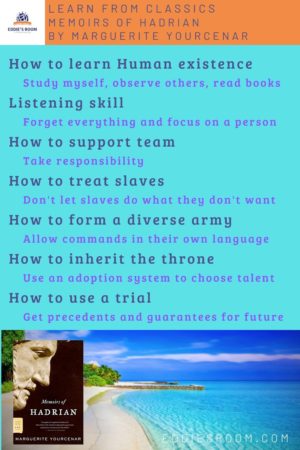Hadrian’s memoirs are written in the form of letters from Roman emperor Hadrian (76-138 AD) to his successors. The story from the emperor reminds us of the scenery as if we were traveling in ancient Rome.
This book has been featured by many people as a masterpiece. And the author describes the special enthusiasm for the book as follows
There are books which one should not attempt before having passed the age of forty.
I want to share what I got from this book.
How to learn Human existence
The emperor was a very thoughtful person, described the following three things to learn about human existence.
Study myself
The emperor said studying myself is the most difficult and dangerous but most fruitful method. Even though he had been living with himself for 60 years, he still misunderstand himself.
For example, he confessed that I’m a little embarrassed that I have a dirty desire to be loved and get attention at all costs. And he thought his strong point was he was more free and obedient than other people.
Observe others
He wrote people often try to hide their secrets from our eyes or trick them into believing they have them.
Read books
It is surprising to me that he can read many books in AD. Yes, there were libraries. Interesting is that he thought books also lie as well as humans. However, reading a book is more reliable than observing people.
Listening skill
The emperor’s advice of listening is very simple.
When listening to a person, forget everything else and focus on that person. I can imagine listening skill was also important in this era.
Management skill
How to deal with a task I don’t like
When he found a disliked task, he immediately made it into a research subject and tried to find a way how we can enjoy the task.
How to support team
When someone took responsibility, we could easily do difficult tasks that we couldn’t do ourselves. Taking responsibility is to help the team and it’s the management task.
How to make a law
If a law is too strict, people go against it. If it’s too complicated, a clever person will find a way to easily get through the mesh of laws. Making a law is not easy.
Laws change more slowly than custom, and though dangerous when they fall behind the times are more dangerous still when the presume to anticipate custom.
This quote suggests that it takes time to make a law. And that’s fine. I’m interested in the law about slaves.
How to treat slaves
He thought that forcing others to do something needs to be carefully regulated by law. For example, it was forbidden to sell slaves to prostitution or gladiator training centers. Only those who like such work should do that.
How to form a diverse army
Since the Roman Empire was a vast country, managing diversity must have been a very important task. He allowed the soldiers to give their ethnic-specific battle cry voices and orders in their own language. This was the diversity in unity, which he considered the goal of the empire.
How to inherit the throne
There will always be more mediocre emperors than wise emperors, and at least one in the first century will be dominated by a mad emperor. Historical heroes usually have mediocre or subordinary children, and they seem to run out of family resources on their own.
The adoption system of the Roman Empire is the solution to address this issue and it’s the greatest rule that has contributed to the prosperity of the Roman Empire. So the Roman Empire chose the wise one and, by adoption, inherited the next throne to him. Then the emperor can secure excellent talent from outside the family.
How to use a trial
He thought that each time he tried a proceeding, the result became a precedent and guarantee for the future.
“I knew that good like bad becomes a routine, that the temporary tends to endure, that what is external permeates to the inside, and that the mask, given time, comes to be the face itself.”
Others
Positioning
He thought it’s important to be No.1. Because the No.2 person has to choose from three options: obedience, rebellion, or compromise which is the most serious option.
Art
He thought construction is collaborative work with the earth. So building a fortress was roughly the same as building a dike. And opening the harbor further enriched the beauty of the cove. He emphasized the artistry and beauty of the building and seemed to enjoy it.
Thank you for reading this post.


